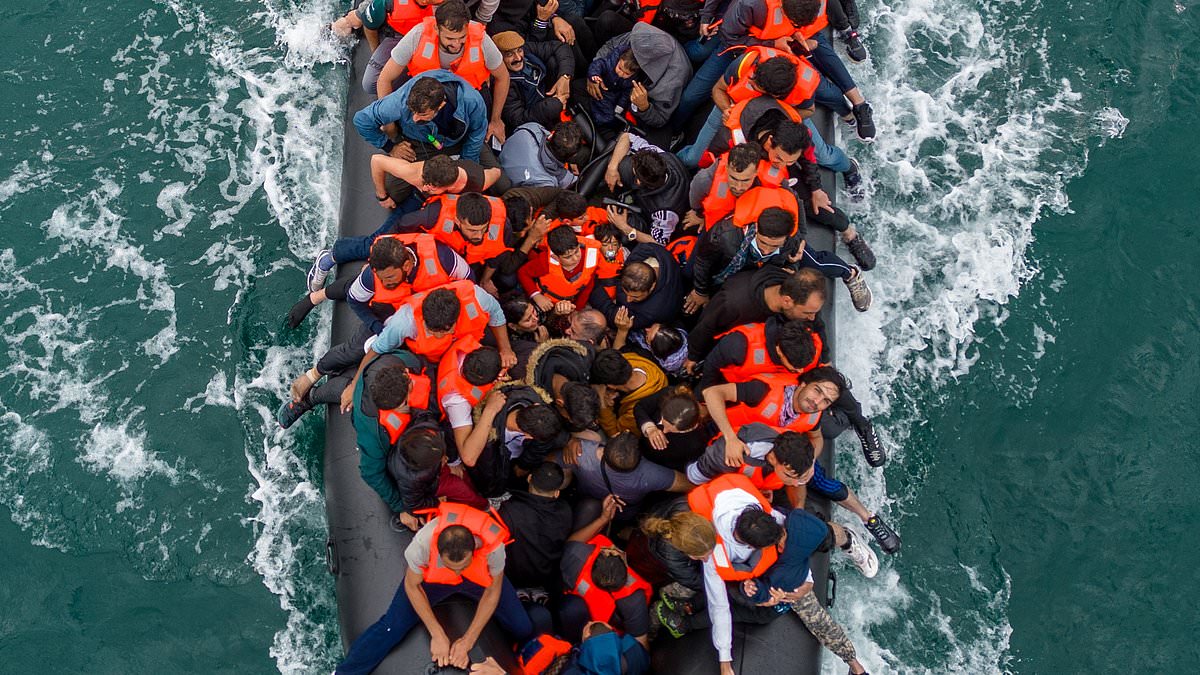Tens of thousands of Channel migrants arriving in Britain escape full police checks and are not even questioned by officials, a damning report reveals.
A watchdog expressed ‘surprise and concern’ that most organised people-trafficking gangs are treated as ‘low priority’ by police and are not being actively investigated.
Incredibly, the major report by His Majesty’s Inspectorate of Constabulary revealed that only one in 15 migrants are quizzed about their contact with smugglers.
The arrivals are only asked to take part in voluntary interviews with a Home Office intelligence team, rather than being compelled to do so.
Labour responded by announcing a new ‘taskforce’ to be led by a deputy chief constable.
Shadow Home Secretary Chris Philp said he was ‘alarmed’ by the report, adding: ‘Illegal migration facilitated by these groups should be the top priority for the police and the National Crime Agency.
‘The Government say they are increasing law enforcement to tackle illegal migration but their response to this report – another taskforce – is laughable. We need action now, not more empty words.’
He went on: ‘The truth is, Keir Starmer’s pledge to “smash the gangs” lies in tatters with over 35,000 illegal migrants crossing the Channel since the election.’
Today’s report concluded that ‘opportunities to gather valuable intelligence relating to organised immigration crime are being lost’.
Border Force teams which process new arrivals at the Home Office base in Manston, Kent, do not have access to the Police National Database (PND), which holds millions of images of known criminals and suspects.
‘This means that any migrants who had been arrested in the UK before, or whose facial imagery had been captured at a crime scene, wouldn’t be identified at Manston,’ it said.
‘Not using this is a weakness in the migrant arrival process.’
The PND holds 6.2billion records from 250 databases, including more than 19million police mugshots as well as images of suspects, such as CCTV footage.
Counter-terrorism police also told inspectors they were ‘concerned about the lack of automated facial-recognition technology for arrivals’, which would also identify suspects, the report said.
Migrants who have reached Britain are ‘potential witnesses and a valuable source of intelligence’ on the gangs, it went on.
However, the Home Office unit responsible for interviewing migrants cannot force migrants to be quizzed.
In 2023 it ‘approached 5,000 migrants and approximately half agreed to be interviewed’, which meant that fewer than one in 15 of that year’s arrivals took part.
‘Law enforcement agencies should increase the proportion of irregular migrants that they debrief for intelligence on arrival,’ the report said.
Police and other law enforcement agencies treated smuggling gangs as ‘low priority and weren’t actively investigating them’.
In a four-level priority system, none of the 79 known organised people-trafficking gangs was given top-level ‘P1’ status. Only 14 were placed in the ‘P2’ and 65 in the lowest two grades.
‘We heard that organised immigration crime hadn’t always been a priority for police forces in England and Wales, largely because they saw it as the responsibility of Home Office Immigration Enforcement,’ inspectors said.
‘That is changing. Police forces are now more likely to prioritise organised immigration crime.’
The Government and the National Crime Agency were ‘too focused on small boats’, the inspectors were told, which ‘may lead to missed opportunities in other areas of immigration crime, such as clandestine vehicle entries into the UK’.
In a further finding, it said organisations responsible for tackling people trafficking have their own IT systems which do not connect with each other.
His Majesty’s Inspector of Constabulary Lee Freeman, who led the review, said: ‘Many opportunities to address these crimes were being missed.
‘Organised crime groups were not being prioritised by law enforcement agencies.
‘We have made ten recommendations that are intended to improve how organised crime groups are being identified and tackled.
‘Their implementation is intended to strengthen the response to organised immigration crime and, ultimately, lead to fewer lives being lost.’
The Home Office said its new Organised Immigration Crime Domestic Taskforce will respond to the report and be led by South Wales Police deputy chief constable Wendy Gunney.
Labour’s Border Security Commander Martin Hewitt said: ‘Police forces across the UK are already very committed to this issue, and while immigration-related arrests and charges have increased, we know there is more to do.
‘So this is about optimising that collective effort to deliver a properly functioning immigration system, and a safe and secure border.’
The number of small boat migrants who have arrived so far this year stands at just under 12,700, about a third up on the same point last year.
